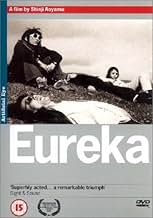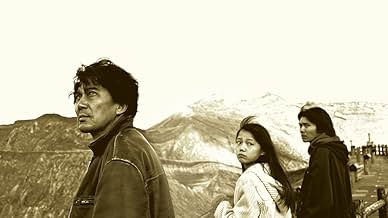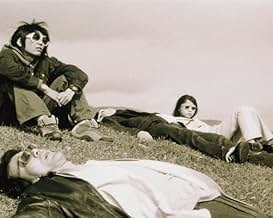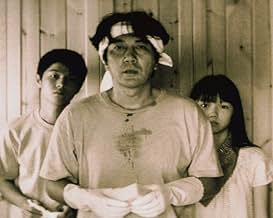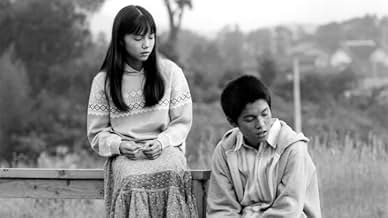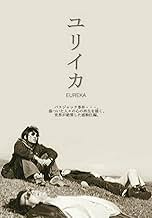Yurîka
- 2000
- 3h 37min
PUNTUACIÓN EN IMDb
7,7/10
4,6 mil
TU PUNTUACIÓN
Los traumatizados sobrevivientes de un secuestro en un autobús se unen para un viaje por la carretera para intentar superar su yo dañado. Mientras tanto, un asesino en serie anda suelto.Los traumatizados sobrevivientes de un secuestro en un autobús se unen para un viaje por la carretera para intentar superar su yo dañado. Mientras tanto, un asesino en serie anda suelto.Los traumatizados sobrevivientes de un secuestro en un autobús se unen para un viaje por la carretera para intentar superar su yo dañado. Mientras tanto, un asesino en serie anda suelto.
- Premios
- 4 premios y 2 nominaciones en total
Reseñas destacadas
10x-miner
I've seen EUREKA yesterday, and I really am impressed.
Along with those beautiful and sophisticated pictures in coloured black-and-white comes a great story; the movie takes both its time to roll out the plot and portrait the main characters. Each single scene is valuable, worth to be seen, contributes a lot to the whole, EUREKA is --despite its sheer enormity-- concentrated on the essentials and thus compact... and: the characters are authentic.
What else can I say? Go, see and feel it!
Along with those beautiful and sophisticated pictures in coloured black-and-white comes a great story; the movie takes both its time to roll out the plot and portrait the main characters. Each single scene is valuable, worth to be seen, contributes a lot to the whole, EUREKA is --despite its sheer enormity-- concentrated on the essentials and thus compact... and: the characters are authentic.
What else can I say? Go, see and feel it!
Amazing film. The reviews posted - at the time of this writing - on the IMDb page are sad, because I don't think the writers were ready for what kind of movie it is. (Stephen Holden's pan in the New York Times is especially foolhardy and thoughtless.) It helped to have a little advanced word, in order to brace myself. As it stands, it should have defeated "Dancer in the Dark" at Cannes last year, handily. And if I see a better movie this year, it'll be something for the history books.
It's not for the faint of heart. It's three hours and thirty-seven minutes long, in black and white, and in Japanese. And it's very slow-moving. The cinematography is beautiful, but that may not be enough for folks to hack through nearly four hours.
But the extreme length and slowness is not unjustified. It opens with a horrifying, traumatic event that provides an emotional undercurrent that informs the remainder of the story, in much the same way as "Saving Private Ryan" did (let that not discourage the anti-Spielbergers), and as the film progresses, the event becomes a memory, part of the characters' and ours, too. And the slowness isn't really slowness - it's the playing out of events and interactions as they would happen in real time (the story spans a few months, I believe, perhaps even a year, and maybe more).
"What's the freaking story?" I hear you ask...well, here goes. The opening sequence, which will undoubtedly inspire comparisons and contrasts to "The Sweet Hereafter" (as will the entire film), shows the hijacking of a commuter bus by a businessman pushed over the edge. As the scene unfolds, he has already killed a few passengers, the police are surrounding the bus, and he has used newspapers to block all the windows.
Without revealing too much, the bus driver and two teens - a brother and a sister - survive the incident. The driver (Koji Yakusho, star of "Shall We Dance?" and "The Eel") is shaken deeply, and leaves his brother and parents to wander. The youths' mother runs off with another man, and their father dies soon after in an auto accident - with insurance payments, they can live, but there is no one to watch over them.
I could go into more of the plot - and most critics will, I'm sure - but that isn't really necessary. The key to the movie is that the events seem to be played out as they would in real life, and that the movie camera just "happens to be there" to catch them and tell the story. Sure, this is the goal of all narrative films, but with "Eureka," the process seems to have been reinvented and renewed. The film is longer than most, but not a moment is wasted; it's one of the most efficiently edited movies I've ever seen. Every shot, nuance, glance, spoken word, everything has a reason for being.
There are some who say the movie is too somber, too gloomy. It isn't really. It's somber, sure, but it doesn't strain for it. There is humor - deadpan, mostly - and great joy, too. And if you love great cinema, there is even greater joy!
It's not for the faint of heart. It's three hours and thirty-seven minutes long, in black and white, and in Japanese. And it's very slow-moving. The cinematography is beautiful, but that may not be enough for folks to hack through nearly four hours.
But the extreme length and slowness is not unjustified. It opens with a horrifying, traumatic event that provides an emotional undercurrent that informs the remainder of the story, in much the same way as "Saving Private Ryan" did (let that not discourage the anti-Spielbergers), and as the film progresses, the event becomes a memory, part of the characters' and ours, too. And the slowness isn't really slowness - it's the playing out of events and interactions as they would happen in real time (the story spans a few months, I believe, perhaps even a year, and maybe more).
"What's the freaking story?" I hear you ask...well, here goes. The opening sequence, which will undoubtedly inspire comparisons and contrasts to "The Sweet Hereafter" (as will the entire film), shows the hijacking of a commuter bus by a businessman pushed over the edge. As the scene unfolds, he has already killed a few passengers, the police are surrounding the bus, and he has used newspapers to block all the windows.
Without revealing too much, the bus driver and two teens - a brother and a sister - survive the incident. The driver (Koji Yakusho, star of "Shall We Dance?" and "The Eel") is shaken deeply, and leaves his brother and parents to wander. The youths' mother runs off with another man, and their father dies soon after in an auto accident - with insurance payments, they can live, but there is no one to watch over them.
I could go into more of the plot - and most critics will, I'm sure - but that isn't really necessary. The key to the movie is that the events seem to be played out as they would in real life, and that the movie camera just "happens to be there" to catch them and tell the story. Sure, this is the goal of all narrative films, but with "Eureka," the process seems to have been reinvented and renewed. The film is longer than most, but not a moment is wasted; it's one of the most efficiently edited movies I've ever seen. Every shot, nuance, glance, spoken word, everything has a reason for being.
There are some who say the movie is too somber, too gloomy. It isn't really. It's somber, sure, but it doesn't strain for it. There is humor - deadpan, mostly - and great joy, too. And if you love great cinema, there is even greater joy!
10aapp22
During its epic 3,5 hours of duration I managed to make some coffee, fry some eggs and let me assure you that I was a totally different man when it ended - It made me think about the real meaning of life, its beauty and subsequent horrors which we all go through at some point in our existence.
This is sophisticated film-making at its best.
This is sophisticated film-making at its best.
It has been almost 6 years since I saw this film, yet this film can stick with me and still offer me things.
After a tragic incident of violence, a bus driver tries to find two other teen-aged survivors, a brother and sister. The sparse black and white camera work provide an insight into the bleak emotional landscape as they just stumble through as "walking dead". Having lost a father, I can identify with the characters. What is touching is the lack of communication and dialogue between the actors (whic includes the lead of the Japanese "Shall We Dance" ). Yet there is love and communication made even by just the thumping on bus walls. Words fail them.
The camera work is bleak yet stunning in composition and texture. Minimal yet just enough to feel the principals trying to find meaning in life. One can also speak of the Japanese economic downturn and the resulting introspective dramatic films such as Hirokazu's "After Life". If have experienced grief or if you'd like to find some insight into it, this may be a film. It seemed shorter than the four hours, but you are forewarned.
After a tragic incident of violence, a bus driver tries to find two other teen-aged survivors, a brother and sister. The sparse black and white camera work provide an insight into the bleak emotional landscape as they just stumble through as "walking dead". Having lost a father, I can identify with the characters. What is touching is the lack of communication and dialogue between the actors (whic includes the lead of the Japanese "Shall We Dance" ). Yet there is love and communication made even by just the thumping on bus walls. Words fail them.
The camera work is bleak yet stunning in composition and texture. Minimal yet just enough to feel the principals trying to find meaning in life. One can also speak of the Japanese economic downturn and the resulting introspective dramatic films such as Hirokazu's "After Life". If have experienced grief or if you'd like to find some insight into it, this may be a film. It seemed shorter than the four hours, but you are forewarned.
the first thing i heard about this movie was that it would be a 3.5 hours long black and white movie with a minimum of dialogues. that was all i needed to know to impatiently anticipate seeing Eureka. it took a while and it only showed in three cinema's here in belgium, in one cinema each month for they had only one copy of the film, so when i heard it played i found myself lucky to finally see it with a showing rate of once a day only five days/week. a bit surprised but then again could've guessed not a lot of people where in the (very)small theatre. as for most movies i anxiously await i held my breath, but this one captured me from the start. ok, better said: after the first scene is over you get involved with the three survivors of the bus-jacking, the driver and two kids - who never speak again from that day on and seem to live on their own (no one seems to know what ever happened to their parents... which is great, i love certain things that aren't explained in the movies,). but now i give away more than i like when writing about movies (this thing about the parents isn't even that important to the story, hence the give-away of this detail) *also, note that i saw this movie in september 2001 and never found it again to see or buy (if anyone has it and wants to get rid of it...)* the film is split up in three major parts. the first describes the fall and 'resurrection' of the driver, the second focusses on the children and how the three meet up again and try to bring their lives back into balance, the last part takes you on a final road trip through the country in a bus turned camper as a final solution type of thing. the last seconds hold a nice little surprise! (k, not a big o' deal - allthough it has this particular distinct meaning,wich i found quite amusing! -and will b lost for 99% of the viewers- the meaning that is) i know the duration was a turn of for a lot of people and i guess i can understand why most find Eureka boooring, but people like that never ever see these things in their whole perspective. if this movie were to've been made more up-tempo'd, it would've lost it's charm toootally. stories like these won't be told just that easily, it has to be absorbed in it's entirety, so one can feel every emotion intended, also gives you a bit time to think about things as you see them unfold instead of afterwords when you have to recollect the whole movie (which i did anyway but hey) this is a must-see-movie when being a moviejunk (especially the anti-hollywood-cinemaniacs) are u an emotional type? with eyes for beauty? see it.
¿Sabías que...?
- CuriosidadesThe brother and sister in the film are played by real life brother and sister Aoi Miyazaki and Masaru Miyazaki.
- Citas
Makoto Sawai: Do you think one can live only for others?
Selecciones populares
Inicia sesión para calificar y añadir a tu lista para recibir recomendaciones personalizadas
- How long is Eureka?Con tecnología de Alexa
Detalles
- Fecha de lanzamiento
- Países de origen
- Sitios oficiales
- Idioma
- Títulos en diferentes países
- Eureka
- Empresas productoras
- Ver más compañías en los créditos en IMDbPro
Taquilla
- Recaudación en Estados Unidos y Canadá
- 49.388 US$
- Recaudación en todo el mundo
- 49.388 US$
- Duración3 horas 37 minutos
- Color
- Mezcla de sonido
- Relación de aspecto
- 2.35 : 1
Contribuir a esta página
Sugerir un cambio o añadir el contenido que falta

